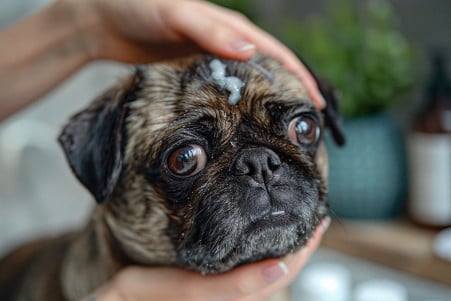Other Options Besides Apoquel for Dogs: Natural, Homeopathic, and Other Medications
26 May 2024 • Updated 25 May 2024

If your dog is dealing with skin issues and you're looking for other options besides Apoquel, there are a variety of natural and other medications that may help. Apoquel is a drug that works to relieve allergic skin issues in dogs by inhibiting certain immune pathways. Some natural options include coconut oil, oatmeal baths, and omega fatty acid supplements. Other prescription options like Cytopoint and corticosteroids can also help, but they do have more side effects.
To help you feel more informed before talking to your vet, we will provide a complete breakdown of natural options, dietary changes, and other prescription medications that can be used in place of Apoquel. This way, you will have the information you need to make the best decision for your dog when it comes to the safest and most successful treatment for their allergies or atopic dermatitis.
Are there alternatives to Apoquel for dogs?
Natural Remedies for Dog Allergies: Natural Anti-Inflammatories and Topical Solutions
If you're looking for ways to help soothe your dog's allergies and skin issues, there are a few natural remedies that can help. For example, turkey tail mushrooms contain compounds like polysaccharide-K (PSK) that can help fight inflammation caused by allergies and support the immune system.
Apple cider vinegar is another natural anti-inflammatory that can be used topically by pet parents to help soothe irritated, itchy skin. It also has antibacterial properties that can help prevent bacterial infections. Coconut oil can also help soothe skin with its healthy fats and vitamin E that can help ease skin irritation caused by allergies.
Chamomile, calendula, and green tea are all herbs that have anti-inflammatory and soothing properties that can help when used in dog baths, according to the American Kennel Club. Probiotics and omega-3 fatty acid supplements can also help by strengthening the immune system and reducing inflammation.
Although they are natural, these remedies can still have side effects, so pet parents should talk to their vet before using them, especially over long periods of time. If you're considering natural remedies, a combination of remedies may be the most effective way to help your dog.
Prescription Medication Alternatives to Apoquel
For dogs with allergies, there are several prescription medication alternatives to Apoquel that veterinarians may recommend. One of these is Cytopoint, a biological injectable that can offer dogs with skin allergies relief that lasts for weeks. Cytopoint blocks the itch signal in the dog's nervous system and doesn't have the same side effects as oral medications.
While antihistamines like Benadryl (diphenhydramine) can be used to help control allergy symptoms, they are generally not as effective as Apoquel, according to Dutch. Temaril-P is another prescription alternative, and it contains an antihistamine and a steroid to help reduce inflammation and itching.
Corticosteroids like prednisone can be very effective for more severe cases, but they also come with a higher risk of side effects when used long-term, according to ElleVet Sciences. Immunotherapy, or allergy shots, is a prescription alternative that can be used to help dogs become desensitized to specific allergens.
When looking at prescription alternatives, it's important to consider the potential side effects and weigh them against the potential benefits. It's also important to work with a veterinarian to find the right treatment for your dog.
Potential Long-Term Side Effects of Apoquel
Apoquel suppresses the immune system, which can make dogs more susceptible to infections and potentially make pre-existing cancers worse. Other side effects include gastrointestinal problems such as vomiting and diarrhea, as well as lethargy, according to PureForm Pet.
More rare but severe side effects can include low blood cell counts, liver toxicity, seizures, and bone marrow suppression, according to Dr. Melissa Eisenschenk. In addition, large overdoses of Apoquel can cause severe gastrointestinal upset, pneumonia, and skin issues, according to PetMD.
Although Apoquel is considered to be safe, veterinarians should closely monitor dogs for long-term side effects. It's important to weigh the pros and cons of using Apoquel to treat a dog's allergies, especially when considering the possibility of long-term side effects.
Diet and Environmental Changes to Help Manage Allergies
Since food allergies can cause skin problems in dogs, a change to a hypoallergenic or novel protein diet can help you determine and remove food allergens, says Revealing the Alternatives to Apoquel for Dogs – Relievet. Reducing exposure to environmental allergens like dust mites, mold, and pollen with air purifiers and frequent cleaning can help you manage allergies. It’s also important to make sure dogs are on flea and tick preventatives, as bites from these pests can worsen allergic reactions in dogs.
Frequent baths with mild, hypoallergenic shampoos can help get rid of allergens on the coat and skin. Feeding dogs a balanced, high-quality diet can help support their immune system and possibly reduce their allergies. A combination of these methods that takes into account both internal and external causes of allergies is likely to be the most effective in the long run.
Combining Therapies for Holistic Allergy Management
Many dogs will need to be treated with a combination of therapies to effectively manage their allergies and skin issues. In some cases, this means that natural treatments like coconut oil, probiotics, and omega-3s will be used in conjunction with prescription medications or dietary changes to create a more comprehensive plan that works together to treat the dog, according to ElleVet Sciences.
It's also important to continue to monitor and adjust a dog's treatment plan as their needs change. This means that pet parents and their vets will need to work together to make sure that the dog's treatment plan is still working for them. As explained by Great Pet Care, this will require open lines of communication between pet parents and their vets.
Taking a holistic, multi-faceted approach that considers both internal and external factors will be most effective for long-term allergy management, as explained by the American Kennel Club. By combining natural, dietary, and prescription treatments with the help of a vet, pet parents can help their dogs find long-term relief from their itchy skin and allergies.
Conclusion: Finding the Right Allergy Solution for Your Furry Friend
Although Apoquel can be an effective treatment for dog allergies, it may not be the best option for all animals and there are potential long-term side effects. Natural remedies, dietary changes, and prescription medication alternatives offer a range of options for treating allergies and skin conditions in dogs.
A combination of these treatments, along with a holistic approach that considers both internal and external factors, can offer the best long-term results. It's also important to note that a dog's needs may change over time, so it may be necessary to adjust their treatment plan. With the right care and attention, pet owners can help their dogs find relief from itchy skin and allergies.


